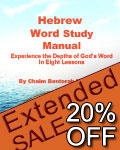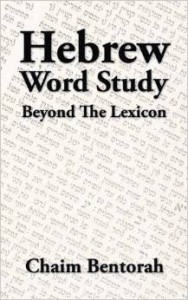
Psalms 119:18: “Open my eyes that I may behold wonderful things from your law.”
The word used in this verse for law is Torah. During David’s time this was a reference to the first five books of the Bible which we call the Pentateuch. Today when the word Torah is used it may be a reference just to the first five books of the Bible or the whole Old Testament. It might be a reference to the entire body of the Jewish sacred books, the Tanach (Old Testament) and Talmud. In this passage David is asking that God opens his eyes so that he may see wonderful things from Scripture. Most Christians today, if they even read the Bible on a regular basis, usually just read a few verses to start their day and never really pray like David that God would open his eyes to see wonderful things from His Word.
There is a story from the Talmud (Bava Batra 145b), about a man who lived in the mountains. He knew nothing about those who lived in the city. He would plant and reap wheat and he ate the kernels of the wheat raw.
One day he went to the city and befriended the people of the city. They brought him fresh baked bread. Having never seen bread and having only eaten kernels of wheat raw all his life he asked: “What is this for?” They said, “Why this is bread, it is for you to eat.” The mountain man ate the bread and found it tasted very good, much more delightful than the raw kernels of wheat he was used to eating. He asked: “What is it made of?” He was told it was made from kernels of wheat which required great effort and time to ground it, mix it with water and leaven, roll it and bake it.
Then they brought him cakes kneaded in oil. He tasted them and said they were splendid, and asked how they were made. Again he was told it was made from raw kernels of wheat, processed just like the dough for bread only kneaded with oil which gave the cakes their rich taste.
Then they brought him royal pastry made with honey and oil. The mountain man ate the pastries and was absolutely delighted. “From what are these wonderful things made?” he asked. “Again he was told from wheat, but processed with honey and oil and baked with great care.
All of a sudden the mountain man declared: “I am the master of these delightful things, for I eat the essence of all of these – wheat.” Alas, because of this view, he knew nothing of the delights of the world, they were lost to him. So it is with one who grasps the principles of the Word of God but does not know all those delectable delights derived from exploring the deeper levels of the Word of God. The mountain man claimed to be a master of wheat, yet knew nothing of its products – bread, cakes and pastries. Many Christians assume that just because they know the simplest literal meaning of Scripture, they do not need to go any deeper.
Yet, David literally demands that God opens his eyes. The word for open is galah which means to make bare, to look beyond the garments, the outward appearance and see what is covered up. Galah is in a Piel imperative form. This opening is a complete revelation. David wants to know the deep complete mysteries of God. The word for eyes is ayin which is also used to mean deep insight. It is also the word for fountain or well of water. This is like pulling a cap off a well and water springs up like geyser.
David wanted to behold the wonderful things of the Word of God. The word behold is navat which has the idea of looking expectantly. It has a paragogic. The best way to express this is like a child waiting to open a Christmas present. David was hoping to see wonderful things. The word rendered as wonderful things is pala’ which means marvelous and awe inspiring.
We have just entered a New Year. Many pastors often distribute little pamphlets entitled Read Through The Bible in One Year. This pamphlet gives a list the verses and chapters of the Bible to be read through each day of the year so that by the end of the year you would have read through the whole Bible in one year. There is even a Bible called Read Through the Bible in One Year. Many make a New Year’s resolution to read through the Bible in the coming year, very few keep that resolution. Those who do often proudly boast that they have read through the whole Bible like it was some great accomplishment and may even declare like the man in the Talmudic story that they are masters of the Word. Yet, these same people can pick up a popular novel that is longer than the Bible and read through it in a few nights and relate the story in the novel with more detail than they can with the Word of God. David was excited about the Word of God, devoured it and loved it. Jewish rabbis spend their lives studying the Torah, they love it, devour it and even memorize it word for word. I get up early every morning and study the Word of God for a minimum of three to four hours in the original languages.
How can someone get so excited about the Word of God? We don’t just eat the raw kernels of the Word of God, we dig into the Word beyond its literal meanings or kernels and turned the kernels into bread (homiletic), cakes (allegorical) and pastries (supernatural). There is so much more to the Word of God than just a surface reading.
If you are having trouble reading the Word of God, or get bored reading it. Perhaps you should cry like David: “Open my eyes so I can behold the hidden wonders of your Word.” Once God begins to do that, you will never get bored with His Word again, you will find it is a well that will never run dry and the more you drink from that well the thirstier you get and the more you drink from that well, the more satisfying each drop will become.
(Just a side note, my book Hebrew Word Study Beyond the Lexicon does offer some insight into how to drill down into Hebrew words giving you an exercise into discovering the depths of God’s Word. The book will be taken off the market in another six weeks, if you are interested in purchasing that book or our Manual on learning Hebrew for devotional purposes, you can purchase these through our website www.chaimbentorah.com).









Recent Comments